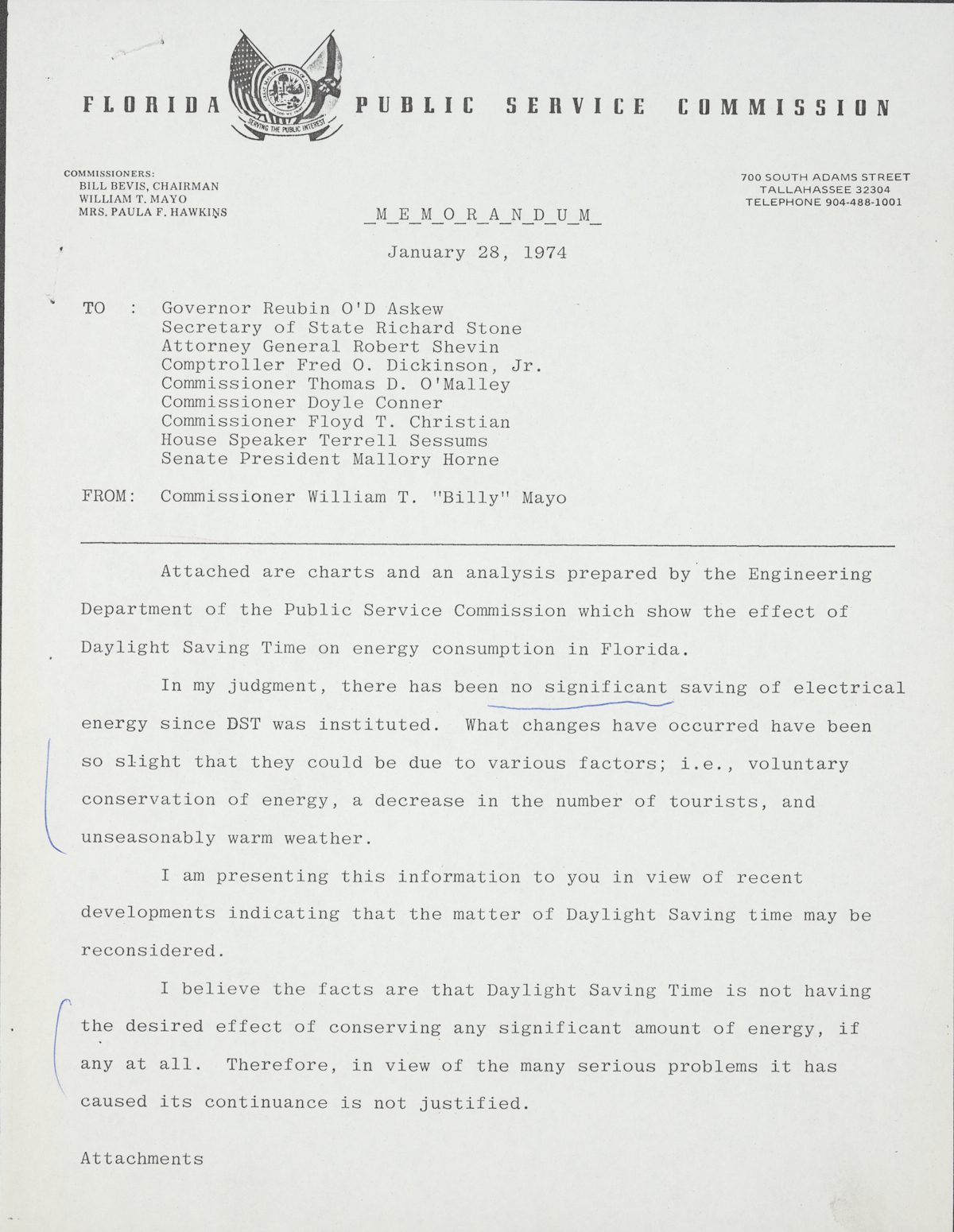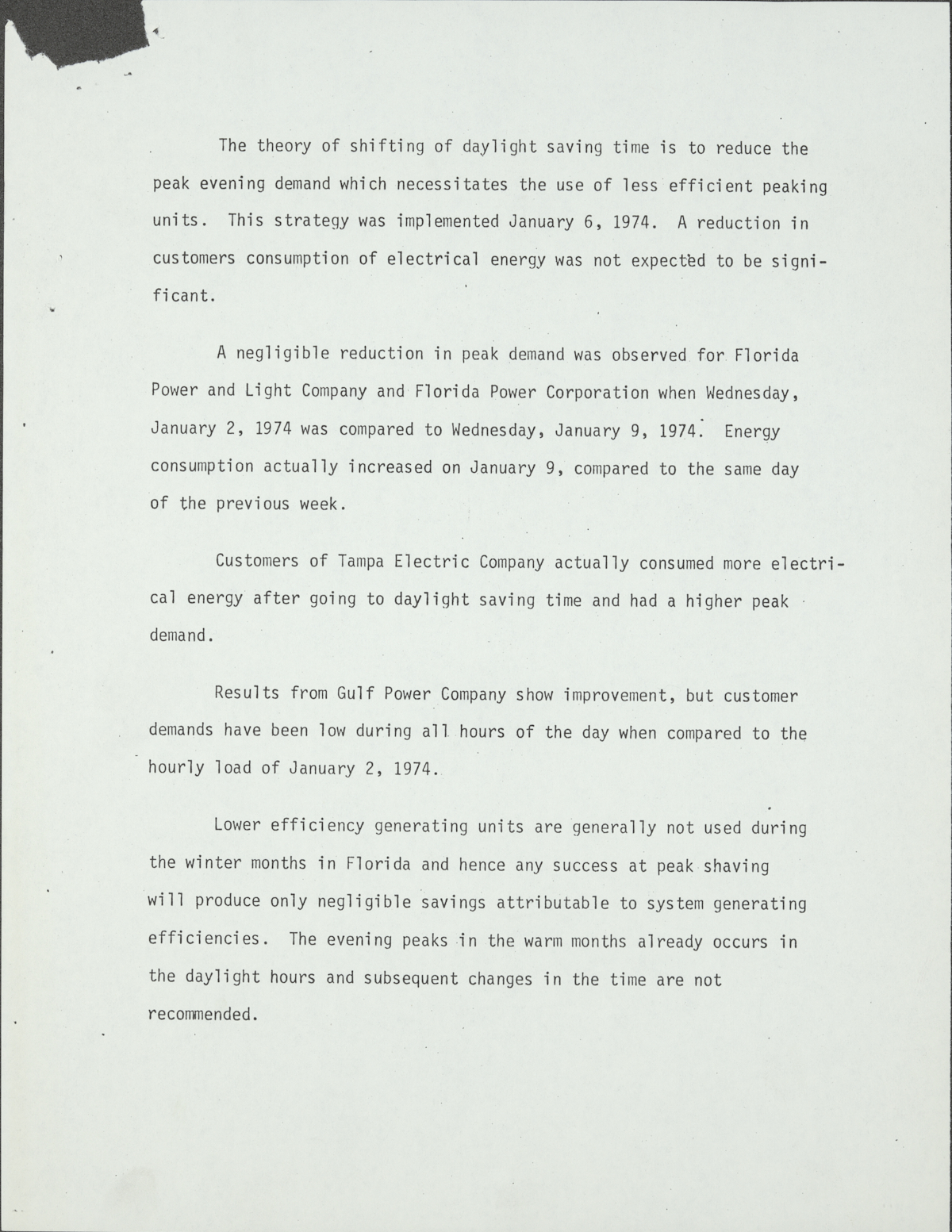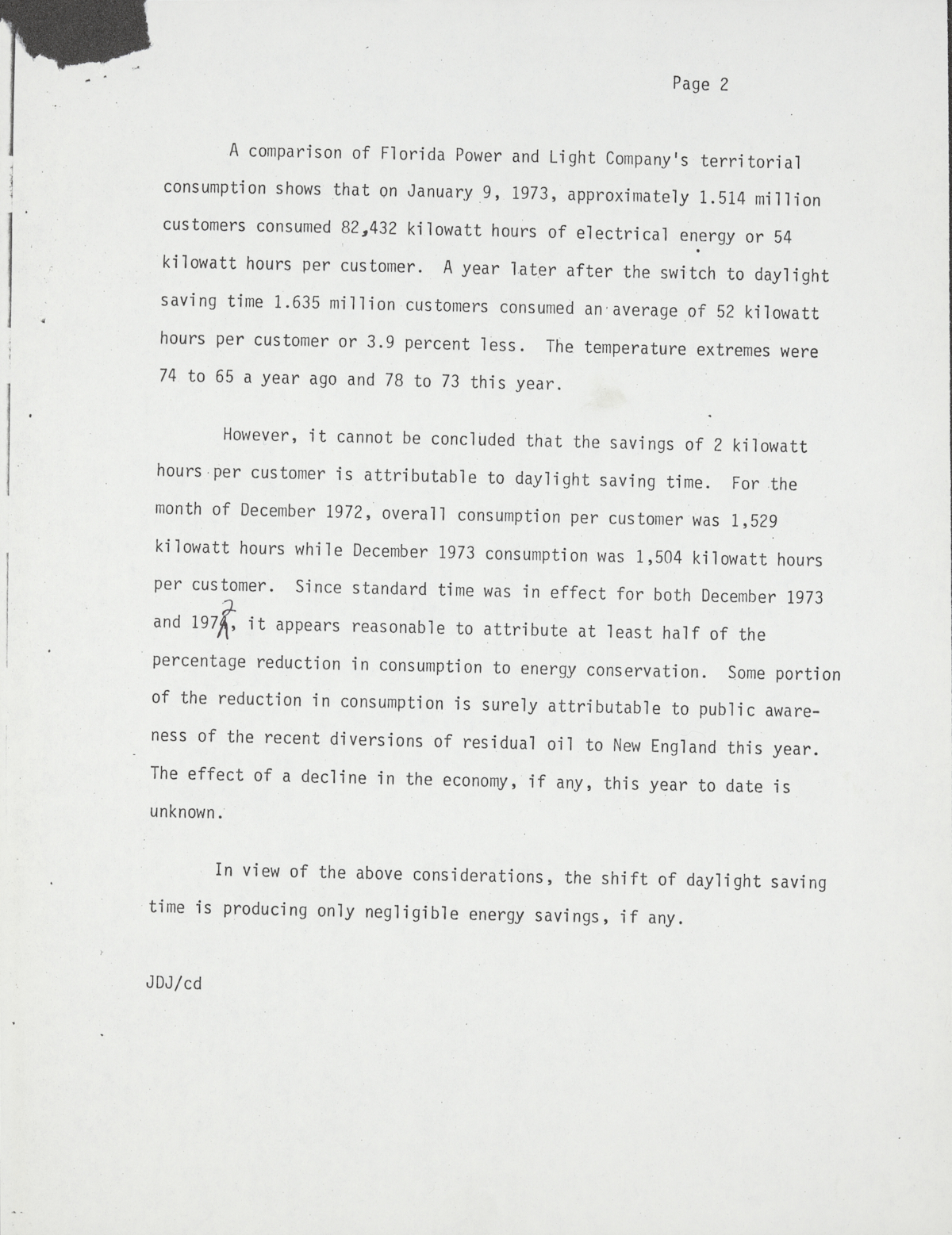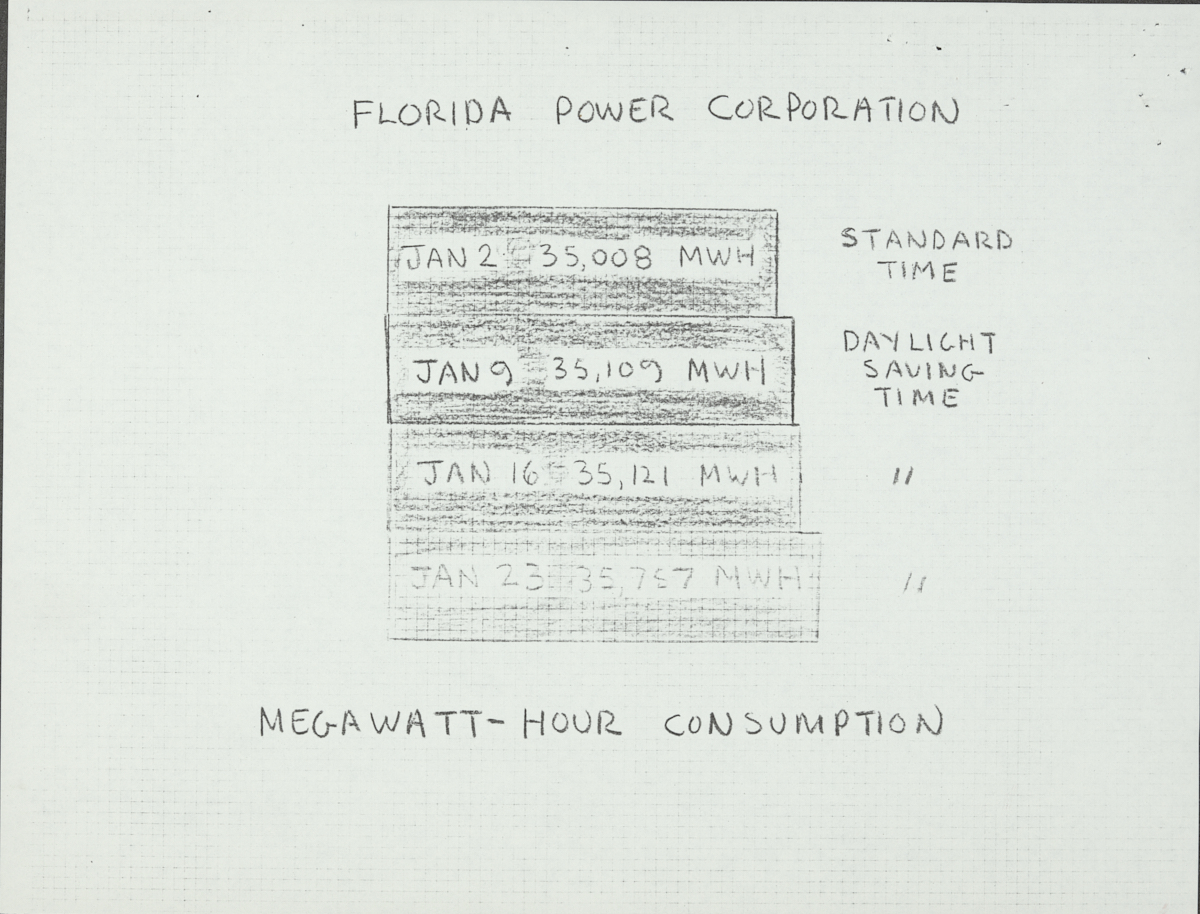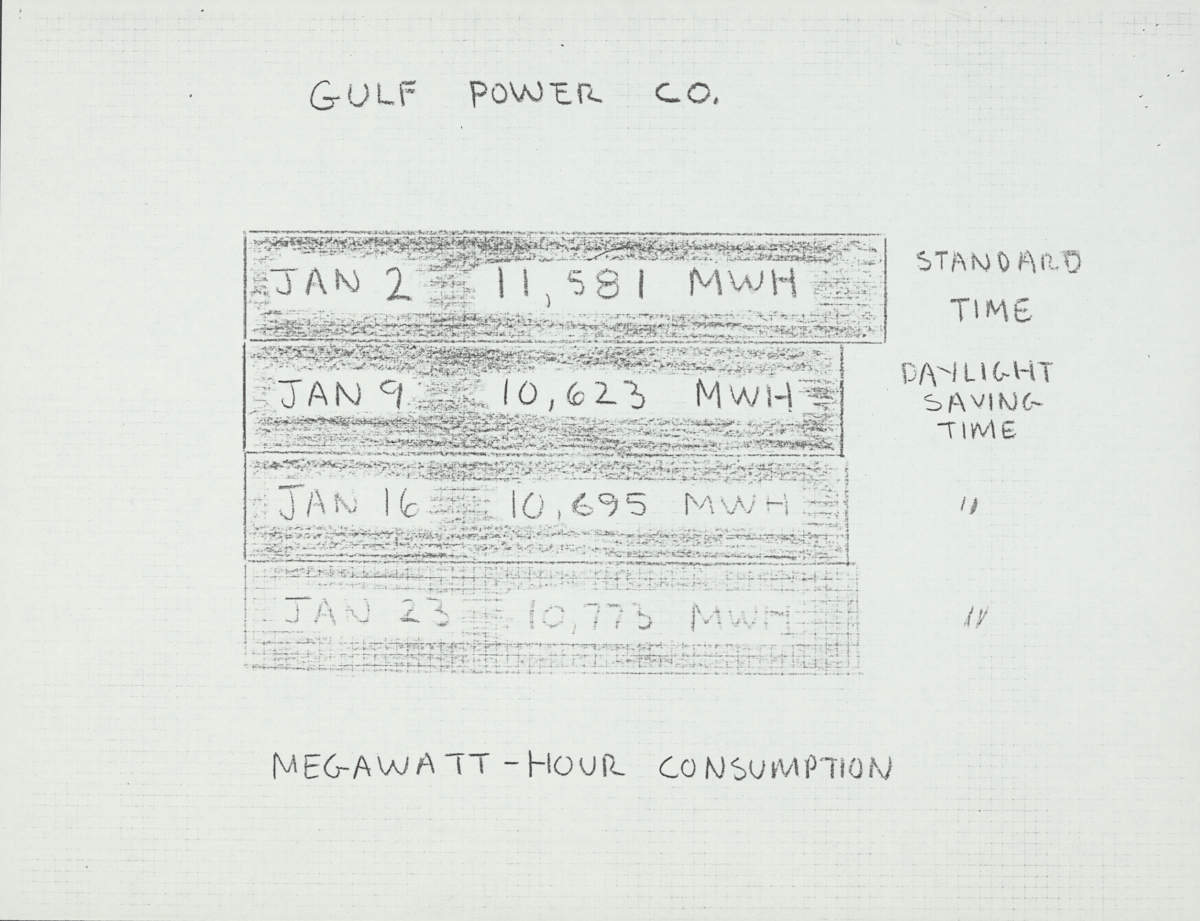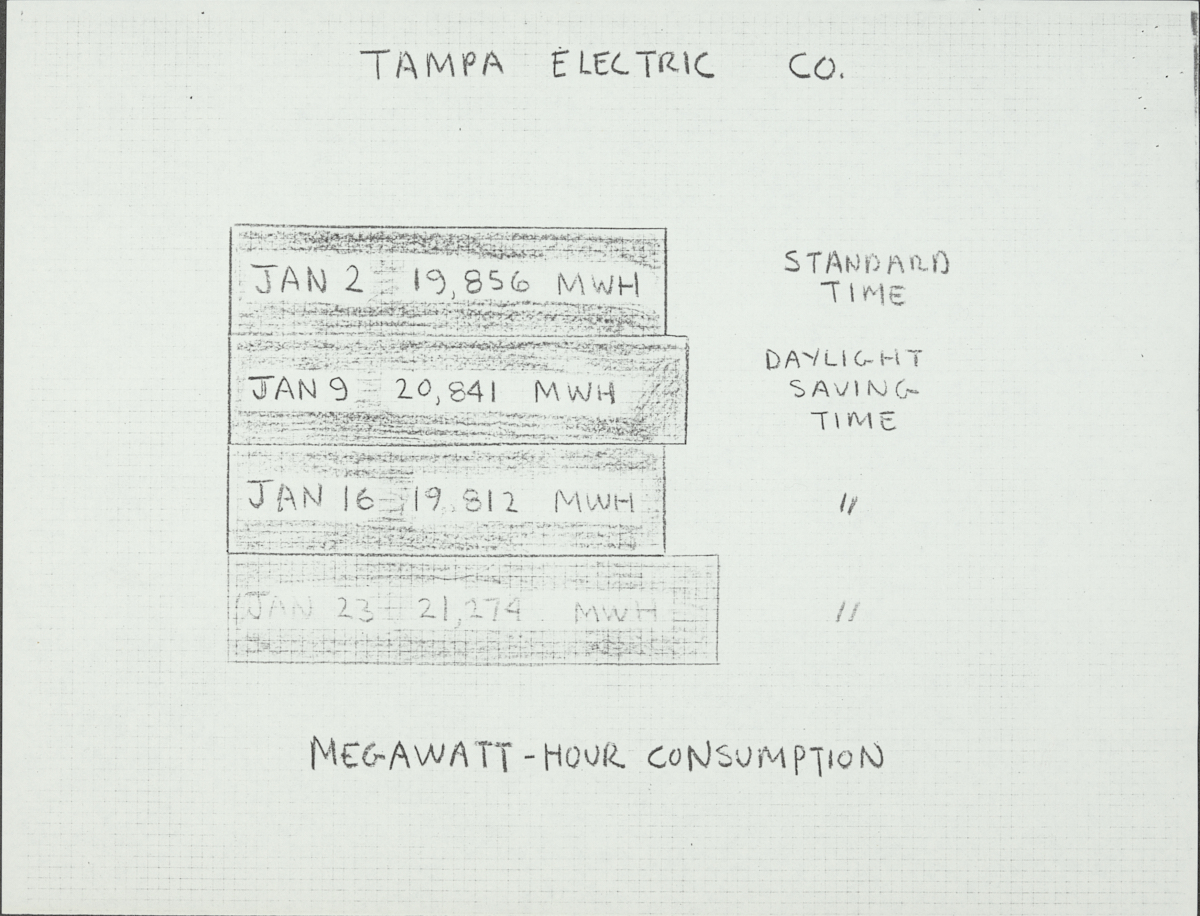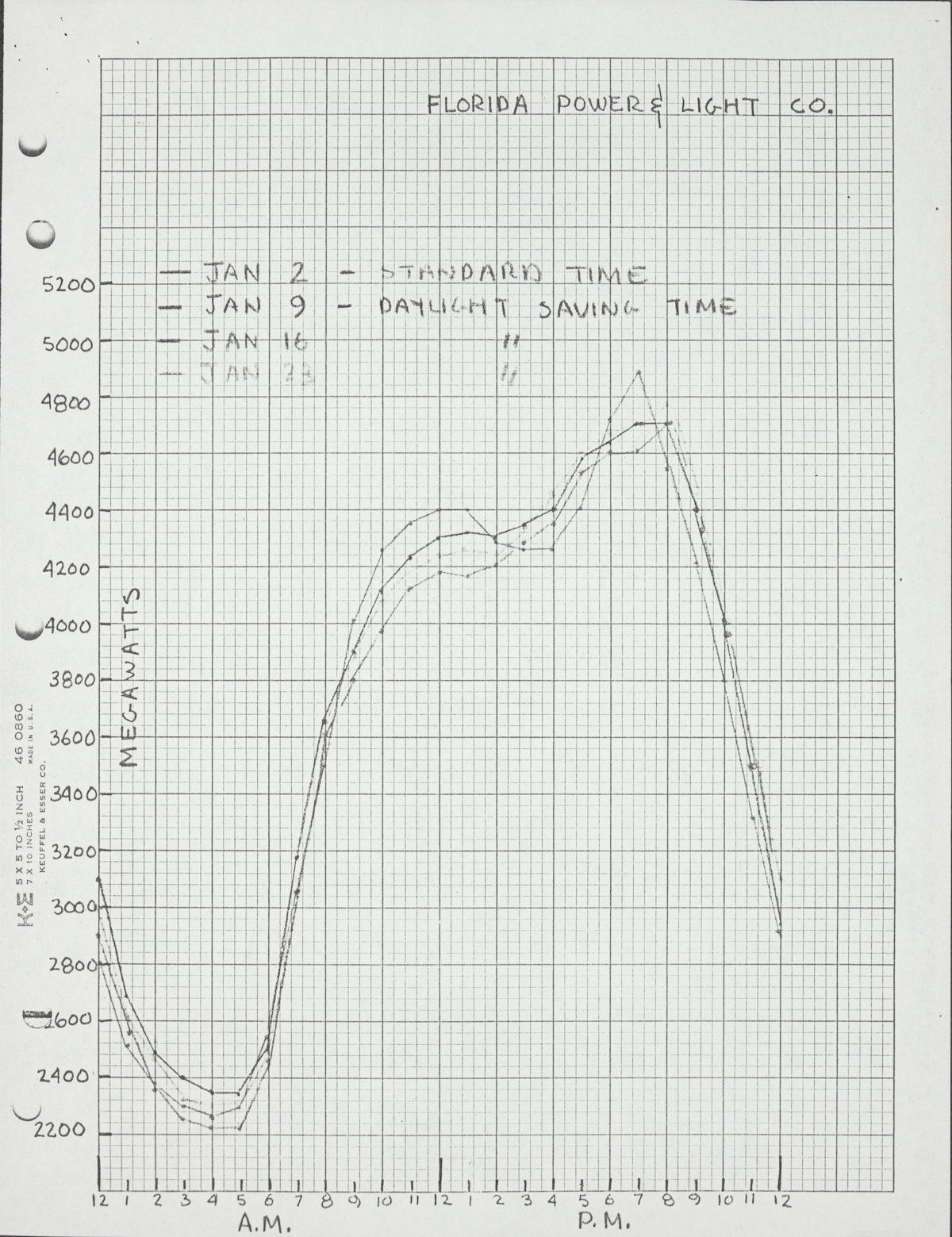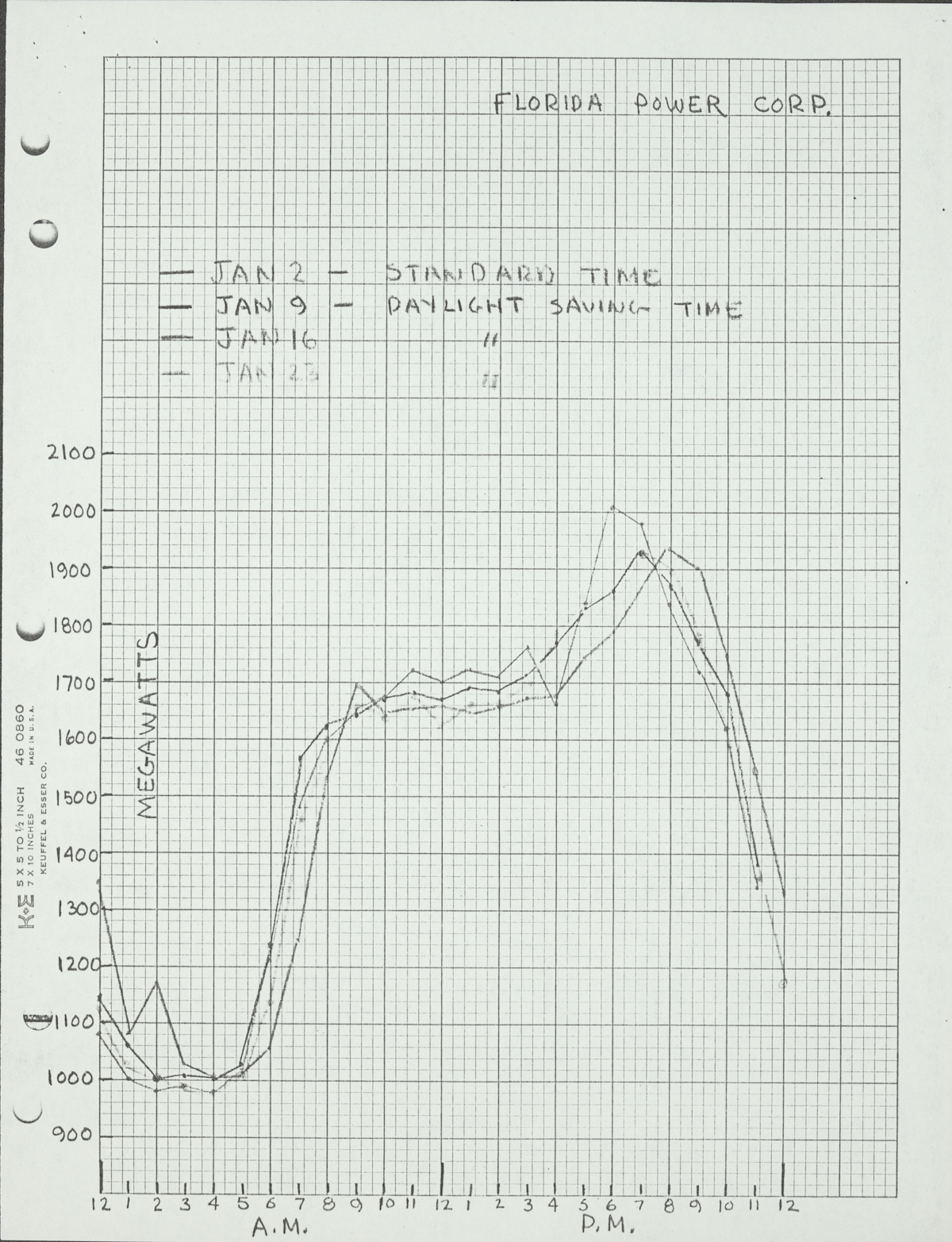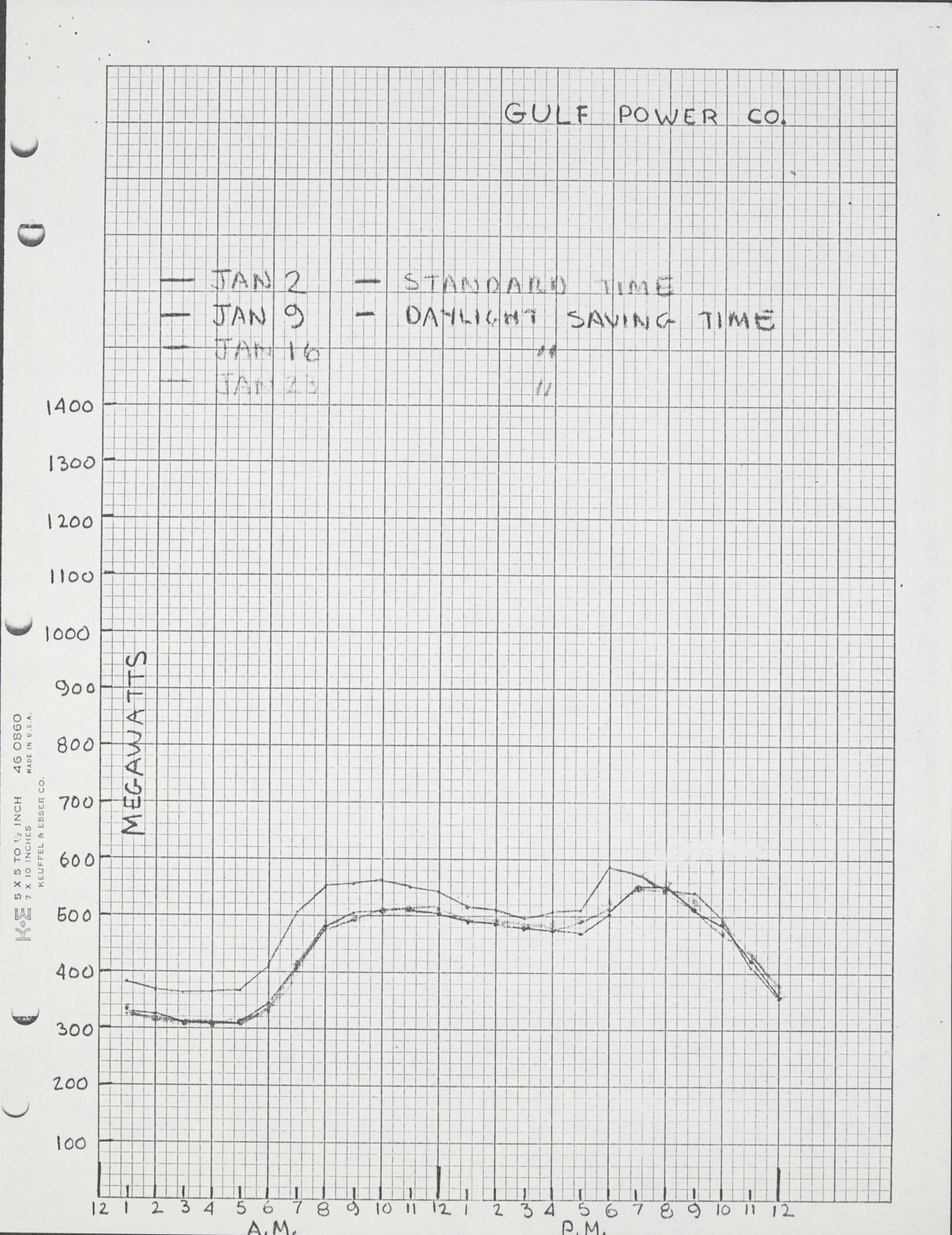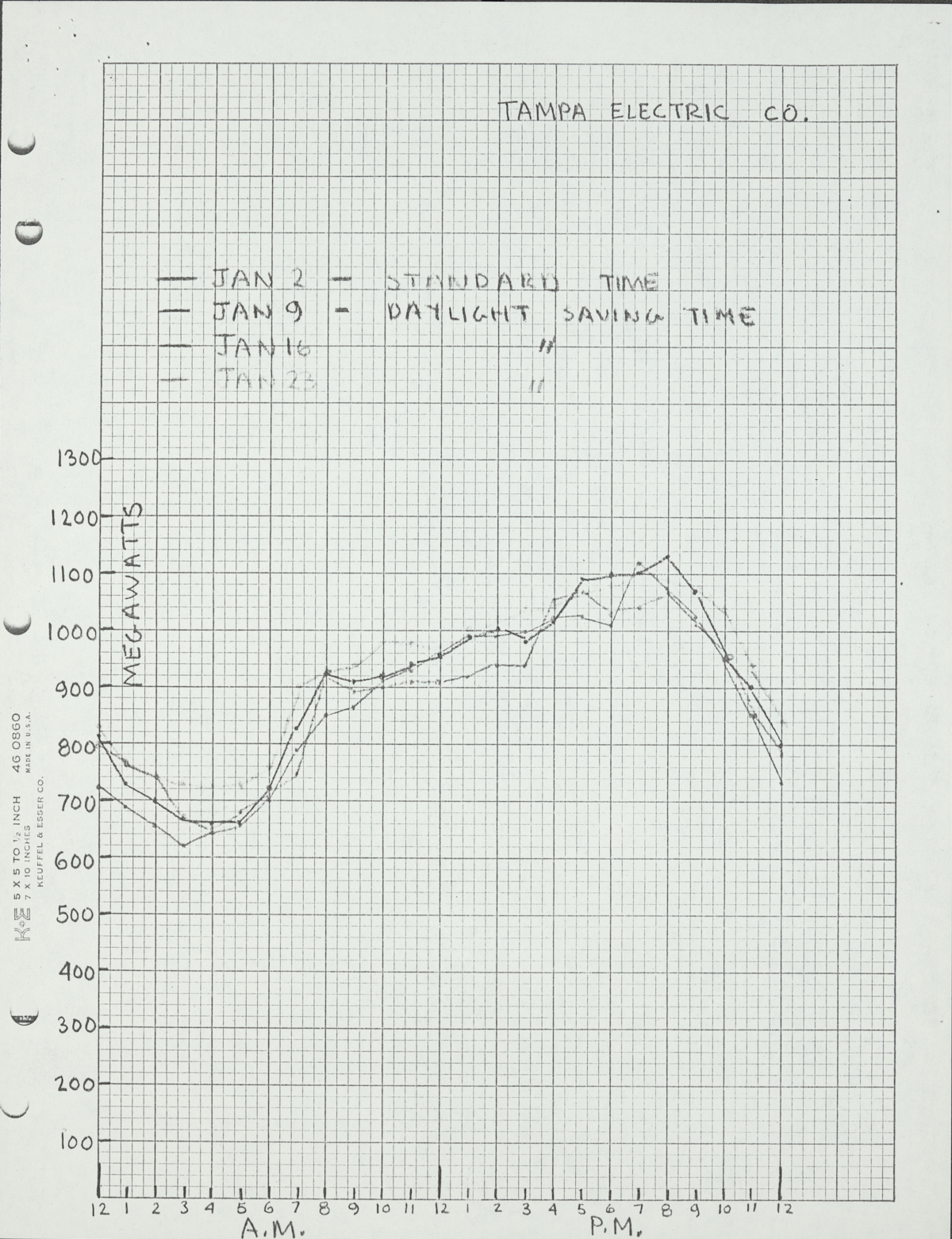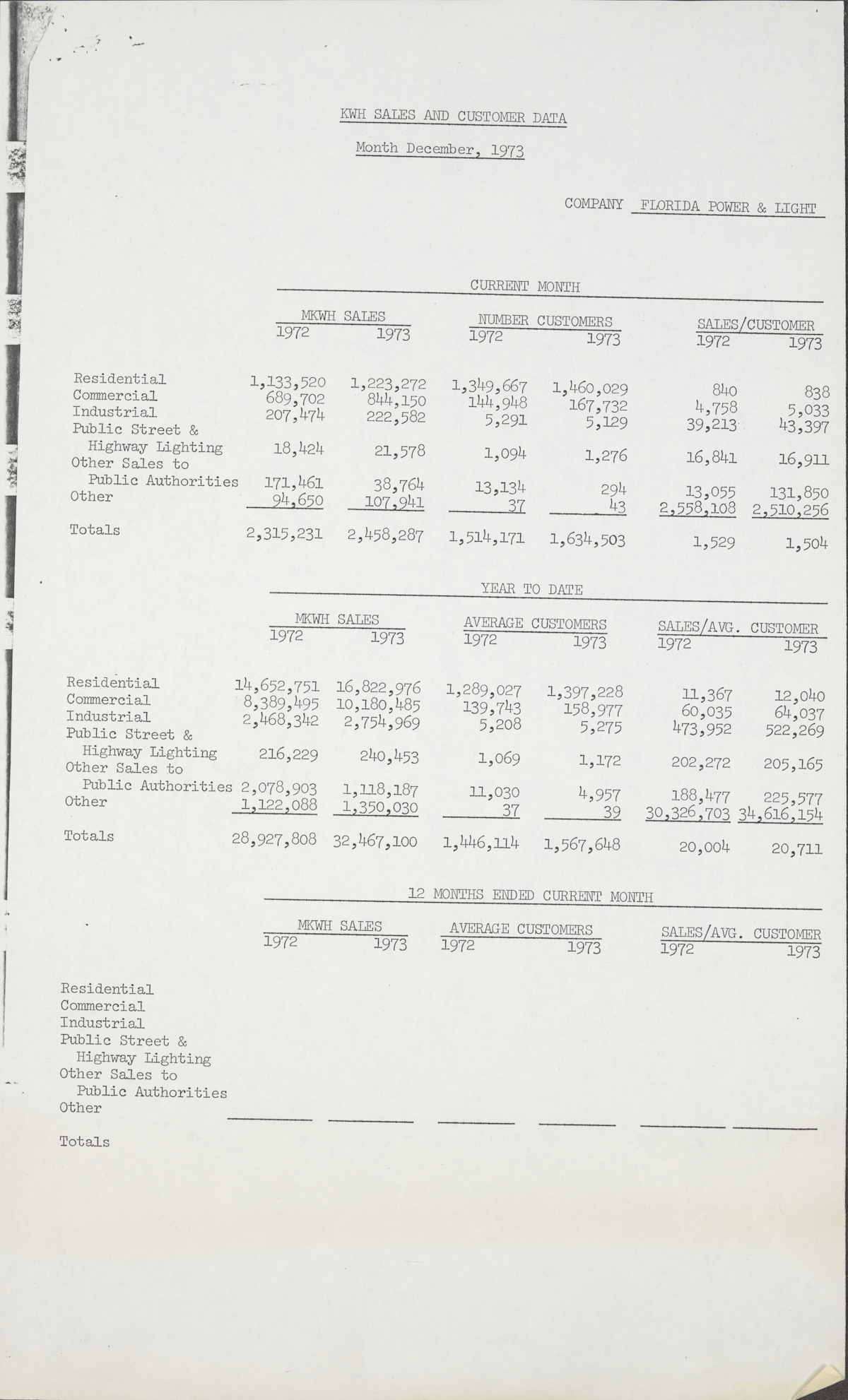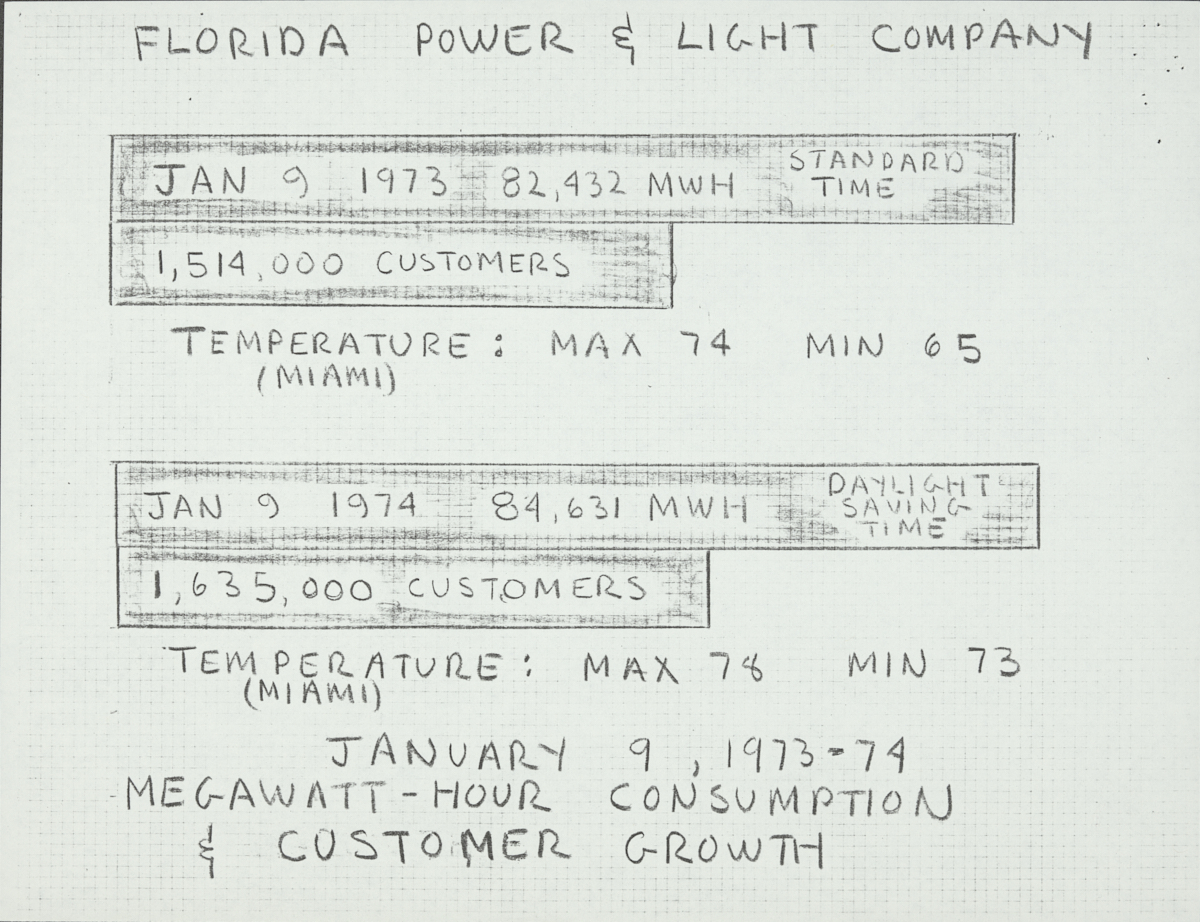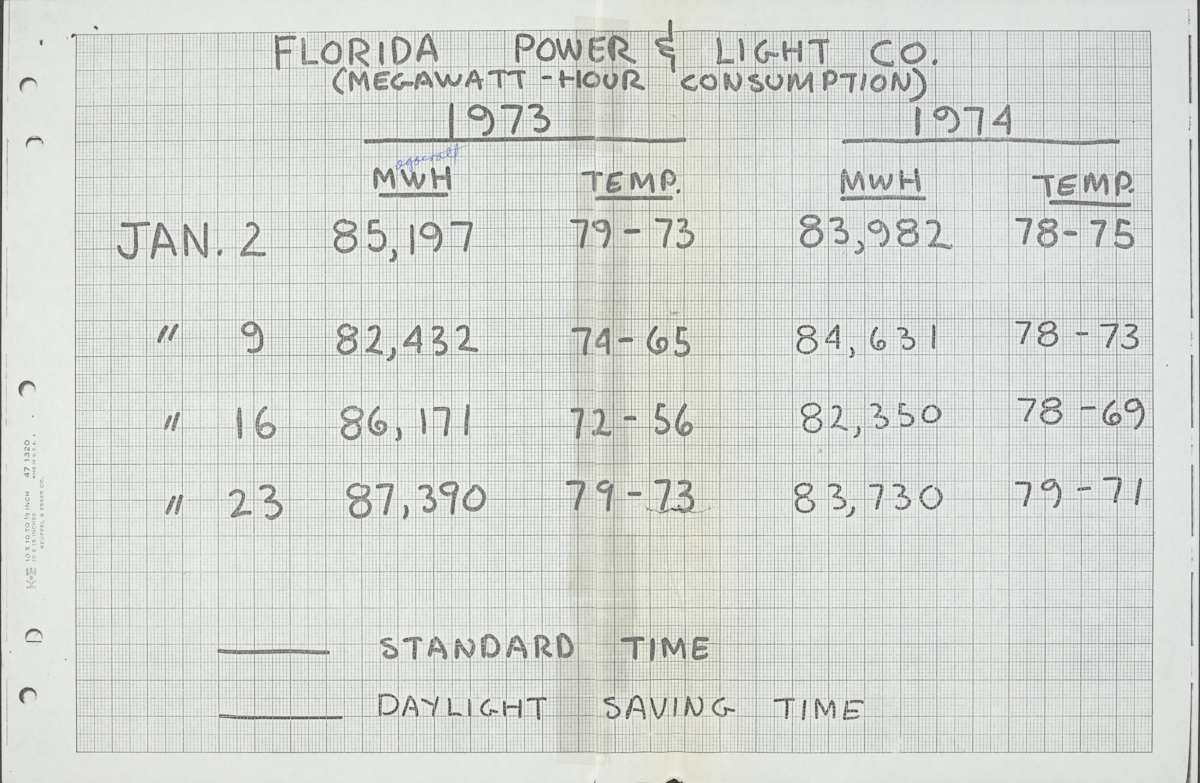Florida Memory is administered by the Florida Department of State, Division of Library and Information Services, Bureau of Archives and Records Management. The digitized records on Florida Memory come from the collections of the State Archives of Florida and the special collections of the State Library of Florida.

State Archives of Florida
- ArchivesFlorida.com
- State Archives Online Catalog
- ArchivesFlorida.com
- ArchivesFlorida.com
State Library of Florida
Related Sites
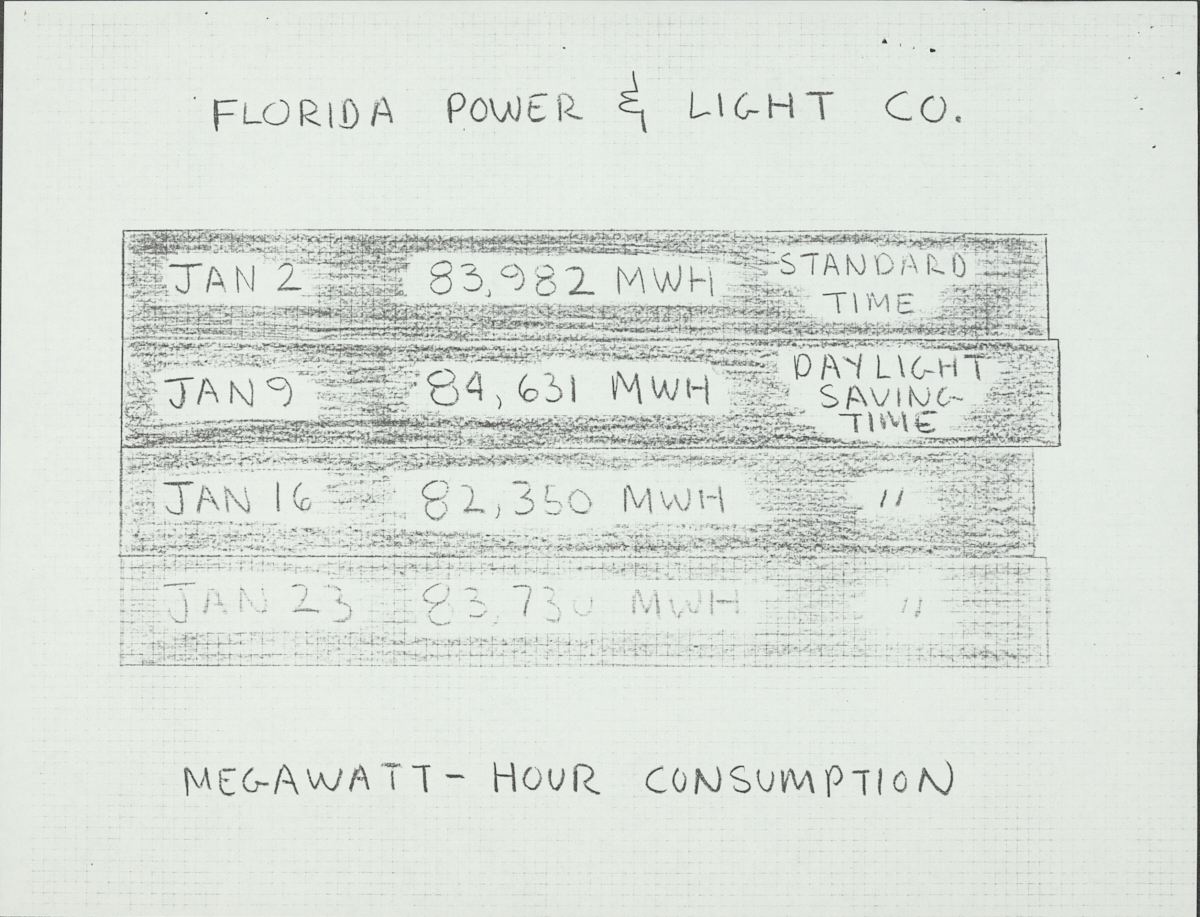
Description of previous item
Description of next item

Memorandum from Billy Mayo, a commissioner of the Florida Public Service Commission, with attached analysis on energy consumption and Daylight Saving Time, January 28, 1974
Source
Description
Date
Format
Topic
Subjects
Askew, Reubin O'Donovan, 1928-2014
Christian, Floyd T., 1914-1998
Conner, Doyle (Doyle Edward), Sr., 1928-2012
Daylight saving
Dickinson, Fred O. (Fred Otis), 1922-1998
Energy conservation
Energy policy
Florida Power Corporation
Florida. Governor (1971-1979 : Askew)
Gulf Power Company
Horne, Mallory E. (Mallory Eli), 1925-2009
O'Malley, Thomas David, 1933-1998
Sessums, T. Terrell (Thomas Terrell), 1930-2020
Shevin, Robert L., 1934-2005
Stone, Dick (Richard Bernard), 1928-2019
Tampa Electric Company
Geographic Term
General Note
In Florida, the change to year-round DST came with serious consequences. In the first few weeks after the time change was enacted, several school-aged children were injured in traffic accidents in the dark mornings on their way to school.
In response to these accidents, there was an outpouring of citizen correspondence to Governor Askew expressing their opinions on year-round DST and whether or not Florida should move to counteract the Federal mandate within the state.
On January 29th, 1974, the Florida Legislature met for a special session to discuss DST. At the end of this session, no legislation was passed, and Florida continued to comply with the year-round Daylight Saving Time that President Nixon established.
In 2018, the Florida Legislature passed the “Sunshine Protection Act” (HB1013/SB858), stating that Florida will enact a year-round DST, provided that the federal Uniform Time Act of 1966 is amended to permit states to do so.
JAN 2 83, 982 MWH STANDARD TIME
JAN 9 84,631 MWH DAYLIGHT SAVING TIME
JAN 16 82,350 MWH [Daylight Saving Time]
JAN 23 83,730 MWH [Daylight Saving Time]
MEGAWATT-HOUR CONSUMPTION
Title
Subject
Description
Creator
Source
Date
Format
Language
Type
Identifier
Coverage
Geographic Term
Thumbnail
ImageID
topic
Subject - Corporate
Subject - Person
Transcript
COMMISSIONERS:
BILL BEVIS, CHAIRMAN
WILLAIM T. MAYO
MRS. PAULA F. HAWKINS
700 SOUTH ADAMS STREET
TALLAHASSEE 32304
TELEPHONE 904-488-1001
MEMORANDUM
January 28, 1974
TO : Governor Reubin O'D Askew
Secretary of State Richard Stone
Attorney General Robert Shevin
Comptroller Fred O. Dickinson, Jr.
Commissioner Thomas D. O'Malley
Commissioner Doyle Conner
Commissioner Floyd T. Christian
House Speaker Terrell Sessums
Senate President Mallory Horne
FROM: Commissioner William T. "Billy" Mayo
Attached are charts and an analysis prepared by the Engineering
Department of the Public Service Commission which show the effect of Daylight Saving Time on energy consumption in Florida.
In my judgment, there has been no significant saving of electrical energy since DST was instituted. What changes have occurred have been so slight that they could be due to various factors; i.e., voluntary conservation of energy, a decrease in the number of tourists, and unseasonably warm weather.
I am presenting this information to you in view of recent developments indicating that the matter of Daylight Saving time may be reconsidered.
I believe the facts are that Daylight Saving Time is not having the desired effect of conserving any significant amount of energy, if any at all. Therefore, in view of the many serious problems it has caused its continuance is not justified.
Attachments
A negligible reduction in peak demand was observed for Florida Power and Light Company and Florida Power Corporation when Wednesday, January 2, 1974 was compared to Wednesday, January 9, 1974. Energy consumption actually increased on January 9, compared to the same day of the previous week.
Customers of Tampa Electric Company actually consumed more electrical energy after going to daylight saving time and had a higher peak demand.
Results from Gulf Power Company show improvement, but customer demands have been low during all hours of the day when compared to the hourly load of January 2, 1974.
Lower efficiency generating units are generally not used during the winter months in Florida and hence any success at peak shaving will produce only negligible savings attributable to system generating efficiencies. The evening peaks -in the warm months already occurs in the daylight hours and subsequent changes in the time are not recommended.
However, it cannot be concluded that the savings of 2 kilowatt hours -per customer is attributable to daylight saving time. For the month of December 1972, overall consumption per customer was 1,529) kilowatt hours while December 1973 consumption was 1,504 kilowatt hours per customer. Since standard time was in effect for both December 1973 and 1972, it appears reasonable to attribute at least half of the percentage reduction in consumption to energy conservation. Some portion of the reduction in consumption is surely attributable to public awareness of the recent diversions of residual oil to New England this year. The effect of a decline in the economy, if any, this year to date is unknown.
In view of the above considerations, the shift of daylight Saving time is producing only negligible energy savings, if any.
JDJ/cd
JAN 2 35,008 MWH STANDARD TIME
JAN 9 35,109 MWH DAYLIGHT SAVING TIME
JAN 16 35, 121 MWH [Daylight Saving Time]
JAN 23 35, 757 MWH [Daylight Saving Time]
MEGAWATT-HOUR CONUMPTION
JAN 2 83, 982 MWH STANDARD TIME
JAN 9 84,631 MWH DAYLIGHT SAVING TIME
JAN 16 82,350 MWH [Daylight Saving Time]
JAN 23 83,730 MWH [Daylight Saving Time]
MEGAWATT-HOUR CONSUMPTION
JAN 2 11,581 MWH STANDARD TIME
JAN 9 10,623 MWH DAYLIGHT SAVING TIME
JAN 16 10,695 MWH [Daylight Saving Time]
JAN 23 10, 773 MWH [Daylight Saving Time]
MEGAWATT-HOUR CONSUMPTION
JAN 2 19,856 MWH STANDARD TIME
JAN 9 20,841 MWH DAYLIGHT SAVING TIME
JAN 16 19,812 MWH [Daylight Saving Time]
JAN 23 21,274 MWH [Daylight Saving Time]
MEGAWATT-HOUR CONSUMPTION
JAN 9 1973 82, 432 MWH STANDARD TIME
1,514,000 CUSTOMERS
TEMPERATURE: MAX 74 MIN 65 (MIAMI)
JAN 9 1974 84,631 MWH DAYLIGHT SAVING TIME
1,635,000 CUSTOMERS
TEMPERATURE: MAX 78 MIN 73
JANUARY 9, 1973-74 MEGAWATT-HOUR CONSUMPTION AND CUSTOMER GROWTH
FLORIDA POWER AND LIGHT COMPANY
(MEGAWATT-HOUR CONSUMPTION)
|
|
1973 |
|
1974 |
|
|
|
MWH |
Temperature |
MWH |
Temperature |
|
January 2 |
85,197 |
79 – 73 |
83,982 |
78 – 75 |
|
January 9 |
82,432 |
74 – 65 |
84,631 |
78 – 73 |
|
January 16 |
86,171 |
72 – 56 |
82, 350 |
78 – 69 |
|
January 23 |
87,390 |
79 – 73 |
83,730 |
79 - 71 |
STANDARD TIME
DAYLIGHT SAVING TIME
General Note
In Florida, the change to year-round DST came with serious consequences. In the first few weeks after the time change was enacted, several school-aged children were injured in traffic accidents in the dark mornings on their way to school.
In response to these accidents, there was an outpouring of citizen correspondence to Governor Askew expressing their opinions on year-round DST and whether or not Florida should move to counteract the Federal mandate within the state.
On January 29th, 1974, the Florida Legislature met for a special session to discuss DST. At the end of this session, no legislation was passed, and Florida continued to comply with the year-round Daylight Saving Time that President Nixon established.
In 2018, the Florida Legislature passed the “Sunshine Protection Act” (HB1013/SB858), stating that Florida will enact a year-round DST, provided that the federal Uniform Time Act of 1966 is amended to permit states to do so.
Chicago Manual of Style
Mayo, Billy (William Taylor), 1917-1996. Memorandum from Billy Mayo, a commissioner of the Florida Public Service Commission, with attached analysis on energy consumption and Daylight Saving Time, January 28, 1974. 1974-01-28. State Archives of Florida, Florida Memory. <https://www.floridamemory.com/items/show/350885>, accessed 16 December 2025.
MLA
Mayo, Billy (William Taylor), 1917-1996. Memorandum from Billy Mayo, a commissioner of the Florida Public Service Commission, with attached analysis on energy consumption and Daylight Saving Time, January 28, 1974. 1974-01-28. State Archives of Florida, Florida Memory. Accessed 16 Dec. 2025.<https://www.floridamemory.com/items/show/350885>
AP Style Photo Citation
(State Archives of Florida/Mayo)

 Listen: The Latin Program
Listen: The Latin Program